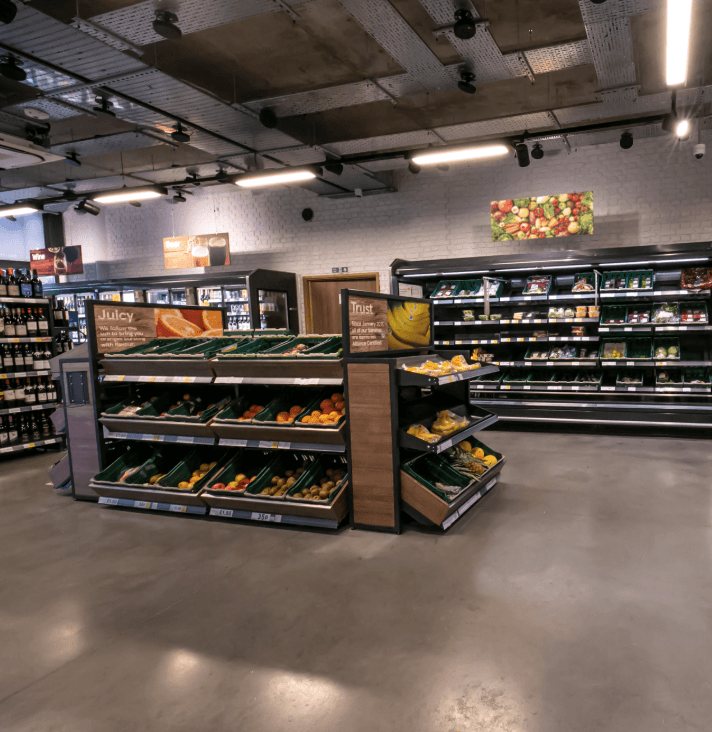UK supermarket behemoth Tesco has partnered with Israel-based checkout technology developer Trigo and made an equity investment in the startup one month after it closed a $22 million Series A round.
“We’ve benchmarked the market in this space, and they are by far and away the best. There’s some really interesting technology being developed that can be really helpful to the shopping experience. It’s much more likely that we’ll take some of that technology in helping our existing stores,” outgoing Tesco CEO Dave Lewis said at a press conference discussing the new partnership.
With Trigo’s technology, customers who sign up for the app will be able to enter the store, pick out products, and leave without having to pay at a checkout kiosk or with a traditional cashier. Trigo Vision has combined computer vision and AI software to create a camera-based system that is able to detect when someone picks an item from the shelf and places it in his or her basket.
Shoppers will have a choice on whether to opt-in by scanning their store membership card when they enter. The items they place in their baskets are tallied and a total is provided when the customer leaves the store. Users can pay either by having their payment information pre-loaded into the store’s membership system or at a multi-tender payment kiosk.
The UK grocer has been known to favor innovation and scout for new technologies, Trigo VP of marketing Ran Peled wrote to AFN. By making an investment in Trigo, the partnership is better aligned for the long term. And as far as he knows, this is the first investment in a cashierless or frictionless checkout system that Tesco has made.
“We share a vision that our technology can be a game-changer for consumers. We hope to keep developing this technology alongside Tesco’s leadership, innovation and ops teams, learning from them how this change will play out in a real-life, multi-format scenario. We hope to work together for many, many years,” Peled said.
Trigo will continue to pursue other partnerships in Europe, the US, and APAC. Tesco marks its first global partner but this does not make the demand they see in other markets any less appetizing. It’s also working in pilot trials with Israel’s Shufersal in footprints as large as 5,000-square-feet.
“We are absolutely honored to have Tesco’s faith in Trigo. We see Tesco as a very forward-thinking grocer. Tesco has always acted as a pioneer of innovation in the world of grocery, from e-commerce to autonomation. This partnership is a huge vote of confidence in the future of frictionless grocery. This partnership will allow us to move beyond piloting and onto scaling,” Tesco CEO Michael Gabay said in a statement regarding the new partnership.
Cashierless grocery technologies have been developing several years now, with self-checkout kiosks taking over countless retail chains. Amazon has been piloting a cashierless concept called Amazon Go that offers an experience similar to Trigo’s.
Retail tech startups raised $1.7 billion in funding last year, representing a 14% decline from $1.9 billion in 2017, according to the AgriFood Tech Investing Report. Despite the drop, the sector scored some major deals including Toast’s $115 million Series D led by T. Rowe Price, which valued the company at $1.4 billion. Brazilian delivery startup Loggi was hot on its heels with a $111 million.
Tesco’s foodtech focus
Tesco has been an active player in food innovation and sustainability. Just this month, Tesco hosted its uniquely named Agri T-Jam that hosted 7-minute pitches before the supermarket giant and its supply chain partners. The winner was a startup called Roboscientifc that has developed a new generation of sensors for detecting disease, infestation, and contamination in agricultural products using volatile organic compounds.
During Climate Week in NYC, Tesco pledged alongside World Bank, Sodexo, and other agrifood corporates a number of commitments toward halving food loss and waste by 2030 in line with the UN’s Sustainable Development Goal Target 12.3. Tesco called for the reporting of food waste by retailers and hospitality businesses to be made mandatory. Company CEO Lewis, said “a lot of food companies have pledged to tackle food waste, but without transparency will not be able to judge if they are delivering on their commitment,” he said, adding that “the UK government has indicated it will introduce mandatory reporting and we call on them to do this urgently.”
It also signed a Statement of Support for the Cerrado Manifesto, which aims to reduce the impact of deforestation around the world.
Last year, Tesco’s head of agriculture told AFN that the company is working to build a strong agricultural sector of the future focused on long-term partnerships with suppliers. This involves conducting top-secret trials of new technologies that can help farmers with better yield forecasting and finding solutions to address water quality.





